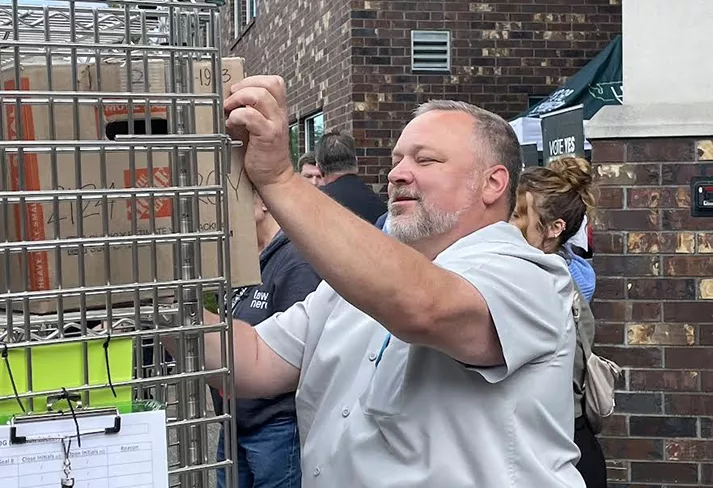
Home » Measure to prevent phasing out of natural gas is on track for fall ballot
Measure to prevent phasing out of natural gas is on track for fall ballot
Supporters submitted 400,000-plus signatures in support of I-2066

Anthony Anton, president of the Washington Hospitality Association, loads a box of signed Initiative 2066 petitions into a cart for delivery to the Secretary of State’s Office on July 2. The proposed measure would halt the state’s push to end natural gas use in homes and buildings.
Courtesy Jerry Cornfield/Washington State StandardJuly 15, 2024
It’s now all but assured voters will get to weigh in this November on Washington’s polarizing efforts to phase out natural gas use in homes and other buildings.
Backers of an initiative aimed at reversing the state’s climate-oriented policies turned in more than 400,000 signatures in support of the measure on July 2. They delivered boxes of petitions for Initiative 2066 to the secretary of state’s office in Tumwater just 49 days after the first ones were signed.
Sponsors said they turned in 431,063 signatures, nearly 110,000 more than required to qualify for this fall’s general election.
“It is very simple. If you have natural gas, this protects you to be able to keep natural gas in your home or in your business. And it protects the freedom of every single Washingtonian to have the clean energy of their choice,” said Greg Lane, executive vice president of the Building Industry Association of Washington, the measure’s main sponsor.
Initiative 2066 repeals provisions of a new state law meant to hasten Puget Sound Energy’s transition away from natural gas. It also bars cities and counties from prohibiting, penalizing or discouraging “the use of gas for any form of heating, or for uses related to any appliance or equipment, in any building.”
And the measure would effectively nullify recent changes to Washington’s energy code designed to get more electric heat pumps – instead of gas furnaces – installed in newly built houses, apartments and commercial buildings.
Critics of the measure say it would force the state to retreat from many fronts in its fight against climate change and pursuit of clean energy.
“I-2066 would take away communities’ choice, jeopardize rebate programs that help families and small business owners afford building upgrades, repeal common-sense measures that make homes and workplaces more energy efficient and healthy, and erode clean air protections,” said Caitlin Krenn, climate and clean energy director for Washington Conservation Action.
“Over time this measure will raise energy costs for hardworking Washingtonians,” she noted.
In a statement, Puget Sound Energy said it is “deeply concerned about the misinformation that continues to be spread about natural gas.”
“There is no ban on natural gas,” reads the utility’s statement. “PSE has an obligation to serve any customer who wants natural gas.”
House Bill 1589, the law targeted by the ballot measure, did not change that so those provisions in I-2066 would not affect PSE or its customers, according to the statement. PSE has posted information on HB 1589 on its website.
Lane disagreed. He insisted the intent of one section of the law “will be the electrification of the state. They can say what they want. I think they’re wrong.”
Gregg Small, executive director of the environmental group Climate Solutions, said the measure “would be a major misstep in our path toward a clean energy future that keeps costs lower.”
Planning is critical to keeping utility bills of existing gas customers as low as possible as the state transitions to other sources of energy to heat homes, he said. By repealing some requirements, the initiative “will cost ratepayers more and negatively impact our health by prolonging our reliance on burning polluting gas in our homes and buildings,” he said.
BIAW, the state’s leading voice for the home building industry, drew up the measure and assembled a coalition of backers including the Washington Hospitality Association, Washington Realtors and Associated General Contractors. BIAW formed a political committee, Main Street Matters to Washington, to help get the measure on the ballot and pass it.
Let’s Go Washington, which qualified three Republican-backed measures state voters are already set to decide in November, conducted the signature-gathering effort.
The group has raised roughly $2.2 million since May 15 when the first I-2066 petitions were signed. Main Street Matters to Washington pumped in $750,000 of that sum and BIAW put in $500,000, making them the largest donors, according to reports filed with the Public Disclosure Commission. Brian Heywood, the millionaire founder of Let’s Go Washington, is not one of the contributors.
If Initiative 2066 qualifies, it will be the first item on the ballot, followed by those other measures that propose scrapping the state’s cap-and-trade system, ending its capital gains tax and making a long-term care program optional.
On July 2, Lane said he didn’t know if BIAW would conduct a separate campaign or coordinate with Let’s Go Washington to convince voters to pass all four.
“I have no idea yet. We’ll have to take a look at that. We’ll have to see what that means for this one,” he said. “We have been solely focused on getting this one qualified.”
This story is republished from the Washington State Standard, a nonprofit, nonpartisan news outlet that provides original reporting, analysis and commentary on Washington state government and politics.
Latest News Real Estate & Construction Energy
KEYWORDS July 2024
Related Articles
Related Products





